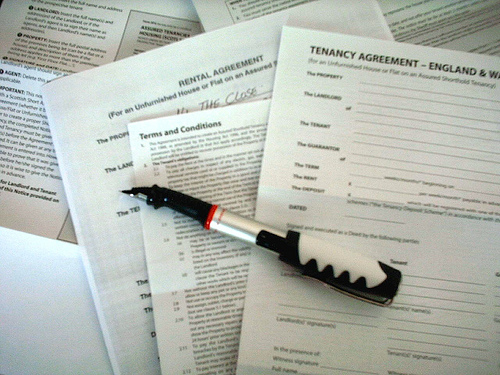 Recently, a client hired us to solve a legal question/problem about a used mobile home that they recently purchased:
Recently, a client hired us to solve a legal question/problem about a used mobile home that they recently purchased:
Question:
Dear Good Georgia Lawyer:
 Recently, a client hired us to solve a legal question/problem about a used mobile home that they recently purchased:
Recently, a client hired us to solve a legal question/problem about a used mobile home that they recently purchased:
Question:
Dear Good Georgia Lawyer:
 Oftentimes our clients hire us to resolve interesting questions and problems. Here is a recent one that addresses the issue of express warranties:
Oftentimes our clients hire us to resolve interesting questions and problems. Here is a recent one that addresses the issue of express warranties:
Question:
Dear Good Georgia Lawyer,

The Official Code of Georgia § 13-4-101 explains the elements and requirements of what is known as “accord and satisfaction.” Accord and satisfaction happens when two parties to a contract, by a subsequent contract, have satisfied the first previous contract, and the subsequent contract has been executed.
What does this mean in simple, plain English?
Well, there are two parts to this law. In a nutshell, the execution of this new, second agreement may amount to a satisfaction of the first, older former contract for two reasons:
1. First, where it is so expressly agreed by the parties (both people state so); or
2. Second, if there was no such agreement to satisfy the first contract, if the new promise is founded on a new consideration (a promise to do something like pay money), the taking of it is a satisfaction of the former agreement.
Here is a good and easy example to understand what it means:
What if I had a contractual agreement with my Uncle Bob that I would hire him to build me a backyard shed for $30,000? Uncle Bob and I agree that I will pay him $10,000 to start the project and $5000 at the end of each week until he is finished.
Unfortunately, during the course of the shed building, Uncle Bob starts drinking again and can barely pick up a hammer to nail a board in straight. The shed turns out completely lopsided and crooked. I tell Uncle Bob that there is no way I am paying him $30,000 for this shed that looks like the leaning tower of Pisa. So, Uncle Bob and I make a new agreement, subsequent from our first contract where I pay him $20,000 rather than the $30,000 I originally promised him.
What is the consideration in this new subsequent agreement? The consideration is that for a $10,000 savings, I gave up what I was entitled to: a well-constructed shed. Uncle Bob gives up his right to full price to avoid being sued for a shoddy performance. Once accord and settlement has occurred, Uncle Bob and I have given up the right to sue for more money under this settlement agreement.
Months later when Uncle Bob is back on the wagon, can he sue me for the $10,000 I was supposed to pay him from the first contract? Can I sue him because I am still mad about the ugly crooked eyesore in my backyard? No! Accord and satisfaction has occurred.
As the Georgia courts have ruled: “Accord and satisfaction is an agreement between two parties to give and accept something in satisfaction of the right of legal action which one has against the other, which when performed is a bar (a blockade) to all actions on this account. Woodstock Rd. Inv. Properties v. Lacy, 149 Ga. App. 593, 254 S.E.2d 910 (1979); M.W. Buttrill, Inc. v. Air Conditioning Contractors, 158 Ga. App. 122, 279 S.E.2d 296 (1981).
Have more questions? Read more here and consider contacting us today to schedule an appointment.
Continue reading →

Sometimes unavoidable emergencies happen. Lightning strikes. Tornadoes blow through Georgia. Floods, fires, and other natural disasters occur. These are called in legal terms “acts of God.” What does Georgia law say about God’s actions having an effect on a contract?
The Official Code of Georgia Annotated § 13-4-21 actually has a section entitled “Effect of Act of God.” No, this is not a religious passage. Rather, this is referring to natural disasters and the like which are all beyond the control of humans, and how these acts have an effect on the parties responsible for performing a contract.
Not everything is considered an act of God. Wars are not. Felder v. Oldham, 199 Ga. 820, 35 S.E.2d 497 (1945). Neither are “reasonably expected rains.” Tasker v. Baugh & Johnson, 124 Ga. 846, 53 S.E. 266 (1906). Of course we all know in Georgia that heavy rains are very reasonably expected, especially in the summer time! Also, an injury (like those caused by an automobile collision) is not an “act of God” if it is caused by the negligence of man. Georgia S. & F. Ry. v. Barfield, 1 Ga. App. 203, 58 S.E. 236 (1907)
Act of God was defined by the Georgia courts over 100 years ago to mean any “accident produced by physical causes which are irresistible; such as lightning, storms, perils of sea, earthquakes, inundations, sudden death, or illness. [Also] an act of God excludes all idea of human agency.” Cannon v. Hunt, 113 Ga. 501, 38 S.E. 983 (1901).
The statute clearly explains that if the performance of a contract becomes impossible as a result of “an act of God,” such impossibility shall excuse the non performance of the contract, except where, by proper prudence, such impossibility might have been avoided by the person who had promised to do something.
It is always good to have an “Act of God” clause in a contract in the unfortunate rare event something does happen which makes the contract impossible to perform. For example, what if I decide to rent your big red barn for my wedding day reception country hoe-down shin-dig? It is the perfect space for the wedding reception luncheon and has a nice wood floor for a dance. It is also perfect to fit the 200 plus guests I plan to invite.
You and I have a contract which states that I agree to pay you $1000 to rent your big red barn on my wedding day. Unfortunately however, lightening strikes and your big red barn burns down to the ground one month before I am about to get married.
What does the law say about the legal obligations of our contract? Can I sue you now for not being able to perform your end of the bargain—letting me host my wedding reception in your barn? Well, the law is clear. O.C.G.A. § 13-4-21 says no. An “act of God” has intervened and it is now impossible to perform your end of the contract. Now it is likely that you will need to return the $1000 to me in order to avoid a claim of “unjust enrichment,” nevertheless, I cannot sue you for failing to provide me your big red barn for my wedding day.
This is an example of how the legal theory of “impossibility” can be a strong defense to performing a contract. A good contract will have an actual “Acts of God” clause in it. Whether you are an atheist or devoutly religious, an “Acts of God” clause in a contract obviously refers to what happens if there is some emergency (not caused by a human) that renders the contract impossible to perform. It is always good to have the parties agree on “plan B” ahead of time, in writing, as part of the contract.
To understand your contractual legal rights and obligations better, it is always a good idea to consult with a good Georgia lawyer.
Continue reading →
 This is part two of our article about cancelling contracts within a three day cooling off period in Georgia. The three day cooling off period is actually federal regulation which is very narrowly applied, so make sure you carefully read part one of our article before reading the following.
This is part two of our article about cancelling contracts within a three day cooling off period in Georgia. The three day cooling off period is actually federal regulation which is very narrowly applied, so make sure you carefully read part one of our article before reading the following.
It is also important to understand that even if the three day cooling off period does not apply to the facts of your case, there may be other conditions and reasons (fraud, misrepresentation, mental/age incapacity, illegality unfair trade practices, and more) that may permit you to rescind (get out of) a contract. Thus, it is is well worth your while to schedule a legal consultation to immediately determine your rights.
Nevertheless, if in fact the three day cooling off period does apply, in connection with any door-to-door sale or sale that is anywhere other than the place of business of the seller, (i.e. NOT the seller’s store but at a place like your home, a conference center, a dormitory, etc…), it constitutes an deceptive act or unfair practice for any seller to:
(a) Fail to give the buyer a fully completed copy of any contract in the same language, (e.g., Spanish), that was primarily used in the oral sales portion of the presentation showing the transaction date, name and address of the seller, and near the section in the contract for the buyer’s signature or on the front page of a receipt, the following notice of cancellation, in bold face, in a minimum of size ten font stating:
“You, the buyer, can cancel this transaction at any time prior to midnight of the third business day after the date of this transaction. See the notice of cancellation attached for explanation of this right.”
(b) Fail to furnish each buyer, a notice of cancellation that explains that they may cancel the transaction, without any obligation or penalty, within THREE BUSINESS DAYS from the above date.
If the buyer cancels, they must receive back their money within ten days and the buyer must make available to the seller at his or her home, any product that had been delivered to them under the contract. They need to return the product in good condition, or they must follow the instructions of the seller regarding the return shipment of the goods at the seller’s expense and risk.
If the buyer makes the goods available to the seller and the seller does not pick them up within 20 days of the date of Notice of Cancellation, the buyer may keep or dispose of them. If the buyer fails to return the goods, then they remain liable for the contract.
(c) Fail, before providing copies of the “Notice of Cancellation” to the buyer, to complete the notices by entering the name of the seller, the seller’s business address, the sales transaction date, and the date of cancellation.
(d) Fail to inform the buyer orally, at the time of the contract, of the buyer’s right to cancel.
(f) Misrepresent the buyer’s right to cancel.
(g) Fail to honor any valid notice of cancellation by refunding payments, etc.
(h) Sell the contract to a third party before the three day cancellation period is up.
(i) Fail, within 10 business days of receiving cancellation, to notify the buyer whether they intend to repossess any goods that were sold.
As stated earlier, this three day cooling off period falls under a federal regulation, specifically from the FTC (Federal Trade Commission) which outlines the rules concerning the cooling off period for sales made at homes or certain other locations. The three day cooling off period only applies to a specific, select type of sales. However, as mentioned previously, we cannot over-emphasize the importance of obtaining legal counsel, because even though the “three day cooling off period” may not apply in your situation, other legal theories may apply which might permit you to rescind (get out of) a contract.
However, time is of the essence in all of these situations. Thus, it is important to immediately meet with an attorney who can actually sit down and review your contract with you and listen to all the facts and circumstances of your situation in order to be able to properly advise you of your legal rights.
Continue reading →

Generally, there is no cooling off period in Georgia except for very rare exceptions, however that doesn’t mean you necessarily are trapped in a contract. There are other conditions and reasons (for example fraudulent misrepresentation, illegality, incapacity, unfair business practices, and more) that may permit you to rescind (get out of) a contract. However, time is of the essence so it is essential to seek a good Georgia lawyer who can help interpret your contract and advise you of your legal rights concerning the facts of your case.
In general, the “three day cooling of period” applies under federal law for only very specific contracts.
Three Day Rule Generally Applies Only Under The Following Conditions:
1. A seller went “door to door” and sold, leased or rented you a consumer good or service with a purchase price of $25 or more and;
2. They (not you) solicited the sale (even if it was following an invitation by you the buyer), and;
3. The offer to purchase was made anywhere other than the place of business of the seller, i.e. NOT the seller’s store but at a place like your house, a convention center, a dorm, a workplace, etc…
There Is No Three Day Cooling Period If The Sale Was:
(1) Made pursuant to prior negotiations you the buyer had while visiting a retail business location which had a permanent fixed location (like a store) where the goods were exhibited (like a furniture shop) or the services were offered for sale on a continuing basis (like a computer repair shop); or
(2) The consumer is afforded the right of rescission by the provisions of the Consumer Credit Protection Act; or
(3) The buyer initiated the contact and the goods or services were required for an immediate personal emergency of the buyer, and the buyer gave the seller a separate dated and signed personal statement in the buyer’s handwriting explaining the situation, acknowledging and waiving the right to cancel the contract within three days; or
(4) The sale was conducted and sold entirely by phone or mail; and without any other contact prior to delivery of the goods or performance of the services; or
(5)The sale was where the buyer initiated the contact and requested the seller to visit the buyer’s home for the purpose performing maintenance or repairing personal property. (However, if in the course of such a visit, the seller sells the buyer the right to obtain additional services or goods other than replacement parts necessarily used in performing the maintenance or in making repairs, the sale of those additional services and goods do not fall within this exclusion); or
(6) Pertaining to the sale or rental or real estate property, to the sale of insurance, or to the sale of securities or commodities by a broker-dealer seller who is registered with the SEC.
There are always exceptions to the rule, so if you suspect you’ve been “done wrong” immediately seek legal counsel to learn what your legal rights and obligations are.
Continue reading →
 The Official Code of Georgia § 13-2-2 sets out “rules for interpretation of contracts generally.” The law states that the following rules, among others, shall be used in order to arrive at the truthful interpretation of a contract. This means if you are having a business dispute with your partner, vendor, tenant, or another company and a question turns on what the contract between you two actually means or whose version (yours or theirs) interprets the contract correctly, consider the following rules:
The Official Code of Georgia § 13-2-2 sets out “rules for interpretation of contracts generally.” The law states that the following rules, among others, shall be used in order to arrive at the truthful interpretation of a contract. This means if you are having a business dispute with your partner, vendor, tenant, or another company and a question turns on what the contract between you two actually means or whose version (yours or theirs) interprets the contract correctly, consider the following rules:
(1) Parol evidence is inadmissible to interpret the written contract.–Parol evidence is anything that is outside of the four written corners of the piece of paper that the contract is actually written on. This could mean conversations that you had over the telephone or notes written on a dinner napkin at a restaurant you were eating at during contract negotiations. The only time this outside evidence (“parol evidence”)should come in to interpret the meaning of the written contract is if it the written contract is somehow ambiguous (unclear) and it is obvious that the written contract wasn’t intended to represent the entire agreement.
(2) Words generally should be interpreted by their usual and common meaning; but a technical word used in particular trades should be interpreted the way they are generally used in that line of business. The local use of a word can be brought in as evidence to determine the actual meaning intended by the parties who entered the contract. In other words, if you and I were chicken farmers and we entered into a contract where you would sell me 500 Rock Cornish broilers, if there was any dispute as to what a “broiler” was, the courts would look to the ordinary local use of how Georgia chicken farmers interpret “broilers.”
 There have been times where we have had clients who have a default judgment against them for a case that they never even knew existed, i.e. proper service and notice were not provided. The good news, is that in order for a judgment to be valid proper service and notice is required.
There have been times where we have had clients who have a default judgment against them for a case that they never even knew existed, i.e. proper service and notice were not provided. The good news, is that in order for a judgment to be valid proper service and notice is required.
What is Service of Process?
Technically, service of process is the means whereby “the court compels the appearance of a defendant before it for compliance with its demands. The term ‘process,’ in fact, includes any and every writ, rule, order, notice, or decree, including any process of execution, that may issue in or upon any action, suit, or legal proceedings. The object and purpose of process is to bring the defendant into court.” See Davis & Schulman § 8:1. Definition and object of process and service thereof.
 Many commercial contract agreements have provisions for attorney’s fees in the event one party breaches the contract. The question is: what does Georgia law say about collecting attorney’s fees from a contract? The Official Code of Georgia Annotated law, O.C.G.A. § 13-1-11, talks about the validity and enforcement of obligations to pay such fees.
Many commercial contract agreements have provisions for attorney’s fees in the event one party breaches the contract. The question is: what does Georgia law say about collecting attorney’s fees from a contract? The Official Code of Georgia Annotated law, O.C.G.A. § 13-1-11, talks about the validity and enforcement of obligations to pay such fees.
Specifically, Georgia law O.C.G.A. §13-1-11 states that obligations to pay attorney fees and an interest rate shall be valid, enforceable, and collectable as part of a debt if collected by an attorney, as long as it is subject to the following:
(1) If your contract provides for attorneys fees in some specific percent of the principle and interest it will be valid and enforceable, but you can never charge over 15 percent of the principal and interest.
(2) If the term in the contract just doesn’t specify a percent, then the provision will be interpreted to mean 15 percent of the first $500.00 of principal and interest and 10 percent of the remainder.
(3) You need to first notify the person who owes you the money in writing that they have ten days after receiving the notice to pay the principal and interest they owe without having to pay for attorney’s fees. If they pay the principal and interest in full before ten days then they won’t be obligated to pay attorney’s fees. If the person who owes you the money refuses to receive delivery of your notice, it will still be considered giving notice.
You do however need to make sure you request the attorney’s fees in your demand letter because if you don’t include any reference to the attorney fees provision in your contract, then you have no right to them. And, if you need to sue to collect the money you are owed, a court cannot award you them either if you never provided notice. E.g. Quintanilla v. Rathur, 227 Ga. App. 788, 490 S.E.2d 471 (1997). Trust Assoc. v. Snead, 253 Ga. App. 475, 559 S.E.2d 502 (2002).
Since you do need an attorney to collect “attorney’s fees,” you do need to make sure you have competent legal counsel representing you in your business dispute involving a breach of contract.
But this is a good thing. Using an attorney’s fees provision is a good way to make sure you cover the cost of your legal fees in the event you get into a business dispute. Having an attorney to help you navigate complex Georgia law is much better than going it alone. In fact, going it alone is the best way to end up in a bad situation. Unfortunately, many times our business clients come in after their situation leaves them with no choice other than retaining legal counsel.
Hire an attorney who can set up preventative measures that place your business in the strongest financial and legal position possible. Smart business owners know this and know that retaining an attorney in order to set up their business to ensure that preventative measures are in place is the best way to save money and make money down the road. For example, it is key that competent legal counsel draft your contract in order to carefully preserve your legal rights. Not only to protect your business interests, but also so they can do the ” smaller things” ensuring that your contract allows you to collect attorney’s fees in the event you must go to court for a breach. These “smaller things” end up being huge, in the long run.
Continue reading →
Sometimes the different types of names for contracts can be confusing. Clients may be unclear as to what type of contract they have or what these words mean. Here is a brief explanation of the various kinds of contracts under Georgia law in simple plain English:
1. Executed Contract: This means that both parties to the contract have done what they are supposed to do. For example, if you pay me $2000 to deliver some cows, chickens, and horses to your farm and I do it, we have an “executed contract.” This means you did what you were supposed to do (pay me the money) and I did what I was supposed to do (deliver the farm animals.) There is nothing left to be done. O.C.G.A. § 13-1-2.
2. Executory Contract: Now let’s say that you paid me the $2000.00 and I delivered you the cows but I still had to deliver the chickens and horses. This is an executory contract which means that something still remains to be done by one of the parties to the contract. O.C.G.A. § 13-1-2.
3. Contract of Record: When a plaintiff (the person who claims injury over a contractual dispute) sues another (the defendant) in court over a contract and the Court renders judgment in favor of the plaintiff that court judgment becomes a contract of record. O.C.G.A. § 13-1-3. So for example, let’s say you hired me to represent you in a breach of contract dispute against Bob who was failing to deliver the chicken, horses, and cows you had paid him for. We sue Bob for breach of contract. The judge rules in your favor and awards you $10,000. That means that judgment becomes a “contract of record.”
4. Specialty Contract: This is just a fancy term for a “contract under seal” which is rarely done, but is considered a formal contract of “higher dignity” and is also subject to a longer statute of limitations. O.C.G.A. § 13-1-4.
5. Parol Contract: This is generally an oral contract and is just as legally enforceable as a written one. (Note there are limitations. Certain types of contracts always must be written.) O.C.G.A. § 13-1-6
6. Absolute or Conditional Contracts: A contract may be either absolute or conditional. Whenever you see words like “as long as” you know something is conditional. For example, a contract that says I will hold a pool party for you this Saturday in exchange for $1000.00 as long as it is sunny weather would be a conditional contract. The condition of course being the weather. If it rains on Saturday, there is no obligation to perform. O.C.G.A. § 13-1-7
7. Entire or Severable contracts: A contract can be “entire” which means the entire contract stands or falls together. This is not an ideal contract and is a good reason as to why it is so important to have an attorney draft your contract. For example, the lawyers at our firm draft contracts that are severable, meaning if it turns out that a certain portion of the contract ends up being ruled as void or illegal by a judge, the entire contract won’t get thrown out on its head. Rather, that portion (the invalid portion) will be “severed” from the contract and the remaining portion of the contract will still apply. O.C.G.A. § 13-1-8
Anytime it is necessary to enter into a contract with another party or enter into a business relationship, it is worth doing it right! The law can be very technical and you want to make sure that in the event of a future misunderstanding or dispute that the contract will be interpreted by a judge in a way that favors you. The only way to insure this is to seek legal counsel prior to entering into a contract.
Continue reading →